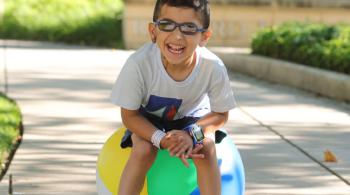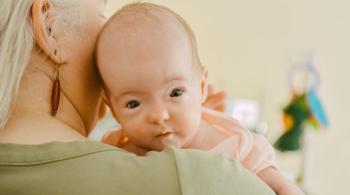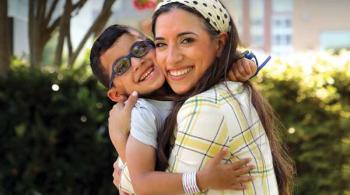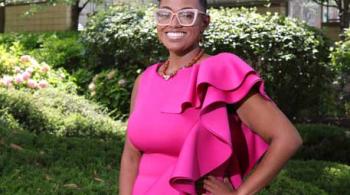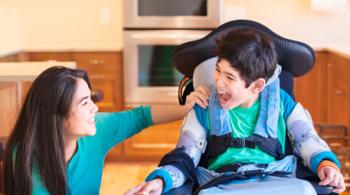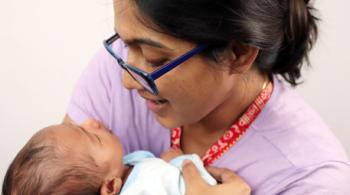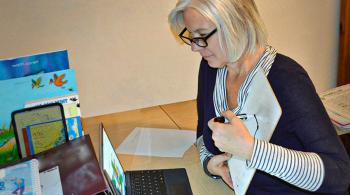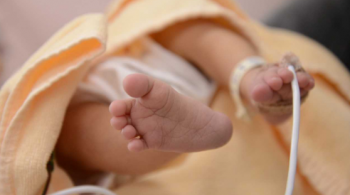By Laura Thornton
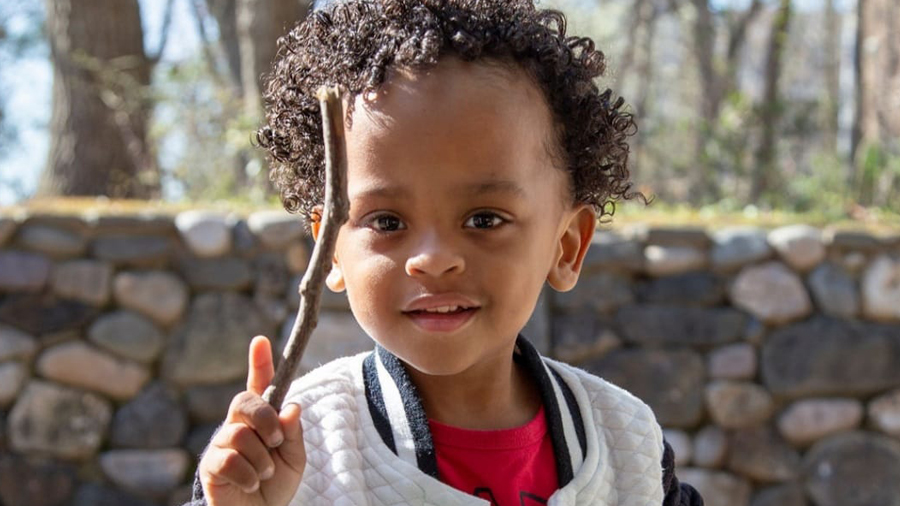
When Lisa gave birth to her son 16 weeks early, she and her husband, Glen, were caught completely off guard. Not only had they become parents months ahead of schedule, but Baby Alexander was only 1.49 pounds—and his brain was bleeding.
“Initially, we didn’t know if it was a Grade 3 or Grade 4 brain bleed,” Lisa recalls. “After a couple of days, doctors settled on Grade 3.” That meant Alexander needed to be monitored very closely, his head circumference measured several times a day to track the bleeding.
Alexander, now 3, was in neonatal intensive care for 108 days, the last month and a half of that time at The Johns Hopkins Hospital. There, Dr. Joanna Burton, a developmental neurologist and co-director of Kennedy Krieger Institute’s Infant Neurodevelopment Center, visited him frequently. “We’d talk and she’d evaluate Alexander,” Lisa says, to ensure that any therapies and interventions Alexander needed could begin as early as possible.
“There was such a sense of relief when Dr. Burton and the Kennedy Krieger neurodevelopment team did their weekly check-in,” Lisa adds. “Considering Alexander’s brain bleeds and prematurity, there were so many things doctors had prepared us for,” including cerebral palsy and autism spectrum disorder. “It was all on the table, which was frightening. But during one of the many visits from Alexander’s medical care team, a neurosurgeon on rounds stopped me from worrying when she said, ‘It’s all environmental.’ I just needed to provide the right environment to support Alexander’s growth.”
Early Detection and Intervention
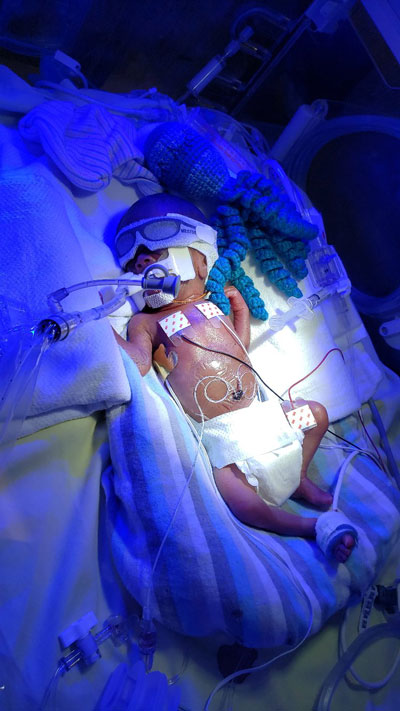 After Alexander was discharged from the hospital, he began regular appointments at the Infant Neurodevelopment Center, an interdisciplinary program that evaluates and treats infants and very young children with a wide variety of medical conditions, including premature birth and perinatal brain injury, that could put them at risk for developmental delays. The center was founded by neonatologist and neurodevelopmental disability specialist Dr. Marilee Allen, who recently retired from Kennedy Krieger.
After Alexander was discharged from the hospital, he began regular appointments at the Infant Neurodevelopment Center, an interdisciplinary program that evaluates and treats infants and very young children with a wide variety of medical conditions, including premature birth and perinatal brain injury, that could put them at risk for developmental delays. The center was founded by neonatologist and neurodevelopmental disability specialist Dr. Marilee Allen, who recently retired from Kennedy Krieger.
“The center’s goal is for each of its patients to grow into their best self,” Dr. Burton says. To accomplish that, the center assesses each baby’s current functioning, identifies their risk for future challenges, provides early identification and intervention services when necessary, and supports the baby’s parents or guardians during their child’s earliest years.
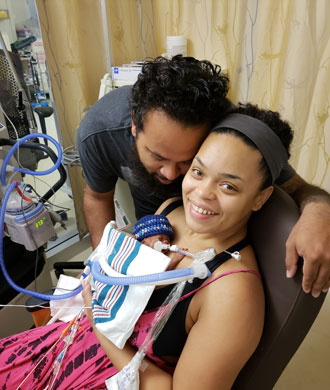 The center provides inpatient consultations for families like Alexander’s at both The Johns Hopkins Hospital and Johns Hopkins Bayview Medical Center, and evaluates patients at Kennedy Krieger within a few months of discharge from the NICU. A truly interdisciplinary team, the center’s staff of 18 includes neurologists, neonatologists, developmental pediatricians, neuropsychologists, nutritionists, nurses, social workers, and occupational and physical therapists. Patients are matched with clinicians to target each patient’s developmental skills and age.
The center provides inpatient consultations for families like Alexander’s at both The Johns Hopkins Hospital and Johns Hopkins Bayview Medical Center, and evaluates patients at Kennedy Krieger within a few months of discharge from the NICU. A truly interdisciplinary team, the center’s staff of 18 includes neurologists, neonatologists, developmental pediatricians, neuropsychologists, nutritionists, nurses, social workers, and occupational and physical therapists. Patients are matched with clinicians to target each patient’s developmental skills and age.
Patients typically have appointments at the center three or four times in their first year of life and twice in their second year, with additional appointments and evaluations as necessary. The center fully evaluates each patient before they transition to receiving care from pediatric specialists outside the center who work with older children. The results of the evaluation help guide that shift in medical care, as well as the child’s transition to preschool.
One of the things that makes the center unique is that neuropsychologists are highly involved in patient evaluations. “The traditional model for NICU follow-up clinics is a blend of medical care and physical therapy,” Dr. Burton says. “But we also look at cognition and the interplay of all domains of development to ensure accurate diagnoses, the right early interventions, and the best possible future for each of our young patients.”
With Kennedy Krieger, we always know we’re not alone.”
– Lisa, Alexander’s mom
“Often, it’s believed that neuropsychologists only see children around school age and beyond, but there are neuropsychologists who specialize in working with infants and toddlers,” explains Dr. Gwendolyn Gerner, a developmental neuropsychologist and co-director of the center.
“Through a combination of standardized tests, consideration of a child’s medical history, and behavioral observations, we’re able to provide important recommendations to support development and learning, even in the face of more challenging motor and sensory impairments,” she says. “When we provide individualized interdisciplinary evaluations that lead to specific, tailored recommendations across different time points in development, the results are powerful. It’s amazing to watch our young patients blossom in their own unique ways.”
The center is part of the Cerebral Palsy Foundation Early Diagnosis and Intervention network, which is working to lower the age of diagnosis for cerebral palsy (CP), and to develop early interventions for babies and young children diagnosed with CP. Across the country, the average age of diagnosis for CP is between 2 and 3 years old, but the center is now diagnosing babies with CP at an average age of 11 months past their full-term due date, Dr. Burton explains.
“The importance of that is two-fold,” she says. “There’s growing evidence that parents are suspecting their child has CP before their child is diagnosed, and a long diagnostic period causes anxiety for parents. But the critical piece is that early CP-specific therapy improves outcomes and functional levels. Getting kids the therapeutic interventions they need as early as possible truly changes their lives.”
Lessons From Telehealth
In March of 2020, the COVID-19 pandemic led many of Kennedy Krieger’s outpatient clinics to offer services via telehealth. The center quickly developed a virtual evaluation model to allow different members of its team to “visit” with a patient and the patient’s parents or guardians, confer with each other, and then talk with the parents or guardians about the evaluation’s results—all during a single telehealth appointment.
Initially, Dr. Burton, Dr. Gerner and their colleagues didn’t think they’d be able to make diagnoses during telehealth appointments. “But on the first day of telehealth, we broke that rule, with three diagnoses,” Dr. Burton says.
While telehealth appointments aren’t ideal for every patient and family, they are helpful for many. “If a baby is on oxygen, or if a family has infant triplets who all need to be evaluated, or if it’s winter and there’s bad weather, telehealth can be a great option to ensure that those crucial early evaluations aren’t postponed,” Dr. Gerner says.
The Right Environment
Alexander, who’s had both in-person and telehealth appointments through the center, has made incredible progress. “We’re giving him the ability to be in an environment that supports his learning,” Lisa says, and Alexander is walking and talking up a storm—in English and Spanish. He’s gone from visiting the Infant Neurodevelopment Center every few months, to returning for an evaluation about once a year.
“Now, when people meet Alexander, I say, ‘He’s about to turn 3,’ not ‘He’s a 24-weeker,’” Glen says. “My son is thriving so well that I want to introduce him as a 3-year-old who’s just had his first soccer practice.”
“Kennedy Krieger helped us find ways to allow Alexander to learn in the way that he needs to learn,” Lisa adds. “Having Kennedy Krieger to lean back on, and to hear them say, ‘Hey Mom, hey, Dad, you’re doing a great job, and everything’s going to be OK,’—that, for us, is just paramount. The journey of being a parent of a micropreemie is difficult, but with Kennedy Krieger, we always know we’re not alone.”


